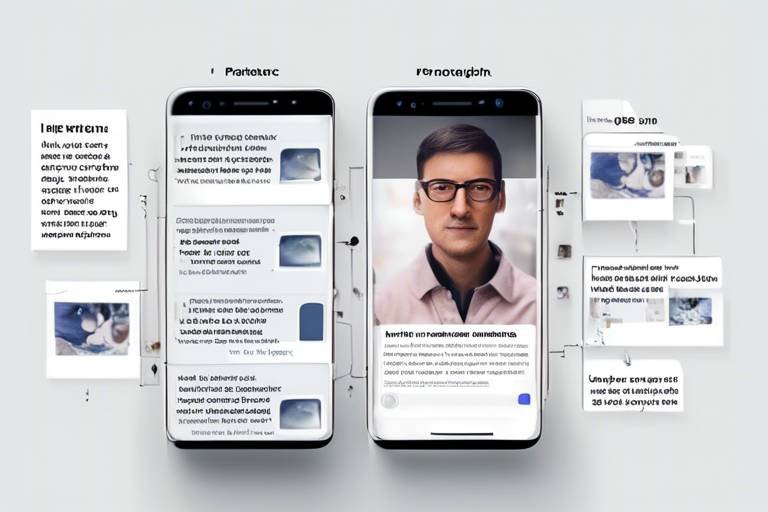The Effects of Smart Technology on Daily Routines
In today's fast-paced world, smart technology has become an integral part of our daily lives, revolutionizing the way we approach tasks, manage our health, and interact with others. Imagine waking up to a gentle alarm that gradually increases in volume, simulating a natural sunrise while your coffee brews itself in the kitchen. Sounds like a dream, right? Well, thanks to advancements in technology, this is now a reality for many. This article explores how smart technology influences our daily lives, examining its impact on productivity, health, and social interactions, while also addressing potential challenges and future implications.
Smart technology streamlines tasks, allowing individuals to manage their time more effectively. From automated reminders to smart calendars, these tools help prioritize responsibilities and improve overall efficiency in daily routines. For instance, AI-powered scheduling assistants can analyze your calendar and suggest optimal times for meetings, freeing you from the hassle of back-and-forth emails. Imagine having a personal assistant that never sleeps, always ready to help you stay organized. This not only saves time but also reduces stress, allowing you to focus on what truly matters.
Wearable devices and smart health apps provide real-time data on physical activity and vital signs. This technology promotes healthier lifestyles and empowers users to make informed health decisions. With features that track everything from heart rate to sleep quality, these devices act as personal health coaches, nudging us towards better habits. For example, if your fitness tracker notices a drop in your activity levels, it might send you a friendly reminder to take a walk or do some stretches. This level of awareness encourages a proactive approach to health, making it easier to incorporate wellness into our busy lives.
Smart technology can monitor sleep patterns and provide insights for better rest. Sleep trackers and smart alarms contribute to improved sleep hygiene and overall well-being. By analyzing your sleep cycles, these devices can suggest optimal bedtimes and even wake you up during the lightest phase of your sleep cycle, ensuring you feel refreshed and ready to tackle the day. A good night's sleep is crucial for productivity, and with smart technology, it’s easier than ever to achieve.
Devices like smart thermostats and lighting systems enhance comfort and energy efficiency. Imagine coming home to a perfectly heated or cooled space, with lights that automatically adjust to your preferred brightness. These innovations not only contribute to a more convenient living environment but also promote sustainability by optimizing energy use. By reducing energy waste, smart home devices can lead to lower utility bills and a smaller carbon footprint, making them a win-win for both homeowners and the planet.
AI assistants, such as Siri and Alexa, help manage daily tasks through voice commands. These digital helpers can set reminders, play your favorite music, and even control other smart devices in your home. The convenience of hands-free operation allows users to multitask more effectively, whether you're cooking dinner or getting ready for work. The integration of AI assistants into our daily routines simplifies many mundane tasks, allowing us to focus on more meaningful interactions and activities.
Smart technology alters how we communicate and connect with others. Social media and messaging apps have reshaped our relationships and social dynamics in everyday life. While these platforms allow us to stay connected with friends and family across the globe, they also bring challenges, such as reduced face-to-face interactions. It's essential to find a balance between online and offline connections to maintain healthy relationships.
Despite its benefits, smart technology presents challenges, including privacy concerns and dependency issues. As we integrate more technology into our lives, it becomes crucial to address these potential downsides. Finding a balance between leveraging smart technology and maintaining our privacy is vital for a healthy relationship with these tools.
With increased connectivity comes the risk of data breaches. As we share more personal information through smart devices, safeguarding our data becomes increasingly important. Users should be aware of the potential risks and take proactive measures to protect their privacy, such as using strong passwords, enabling two-factor authentication, and regularly updating software. By being vigilant, we can enjoy the benefits of smart technology without compromising our personal information.
This subheading discusses the risks associated with becoming overly dependent on smart technology, emphasizing the need for moderation. While technology can enhance our lives, an over-reliance on it may impact our critical thinking and problem-solving skills. It’s essential to cultivate a healthy relationship with technology, ensuring that it serves as a tool to enhance our lives rather than dictate them.
- What is smart technology? Smart technology refers to devices and systems that connect to the internet and can be controlled remotely, often enhancing convenience and efficiency in daily tasks.
- How does smart technology improve productivity? Smart technology helps automate tasks, manage schedules, and streamline workflows, allowing individuals to focus on more critical responsibilities.
- Are there risks associated with smart technology? Yes, risks include privacy concerns, potential data breaches, and the possibility of becoming overly reliant on technology for everyday tasks.
- How can I protect my privacy with smart devices? Users can safeguard their privacy by using strong passwords, enabling two-factor authentication, and being cautious about the information shared online.

Enhancing Productivity
In today's fast-paced world, smart technology has become a game-changer for enhancing productivity in our daily routines. Imagine waking up to a world where your devices seamlessly sync with your schedule, reminding you of important tasks and appointments without you having to lift a finger. This is the reality that smart technology offers, transforming how we manage our time and responsibilities. With tools such as automated reminders, smart calendars, and task management apps, individuals can prioritize their activities more effectively than ever before.
Consider the traditional way of keeping track of tasks—sticky notes plastered on your desk, a cluttered planner, or even a mental checklist that often gets forgotten. Now, picture replacing that chaos with a sleek digital assistant that not only reminds you of deadlines but also learns your preferences and habits over time. This level of automation allows for a streamlined approach to productivity, ultimately leading to improved efficiency in our daily lives.
Moreover, smart technology fosters collaboration in both personal and professional settings. Tools like shared calendars and project management software enable teams to work together seamlessly, even from different locations. This means no more back-and-forth emails or missed meetings. Instead, everyone stays on the same page, which enhances overall productivity. For instance, platforms like Trello and Asana allow users to create, assign, and track tasks in real-time, making project management a breeze.
To illustrate how smart technology enhances productivity, consider the following table that outlines some common smart tools and their benefits:
| Smart Tool | Benefit |
|---|---|
| Smart Calendar | Automatically syncs appointments and sends reminders. |
| Task Management Apps | Helps prioritize tasks and track progress. |
| Voice Assistants | Allows hands-free task management and information retrieval. |
| Collaboration Tools | Facilitates real-time teamwork and communication. |
In addition to these tools, smart technology also encourages a more organized workspace. With the rise of smart office devices, such as automated lighting and temperature control, individuals can create an environment that boosts focus and minimizes distractions. For instance, studies have shown that a well-lit and comfortable workspace can significantly enhance productivity levels. By leveraging smart technology, you can customize your work environment to suit your needs, making it easier to concentrate and get things done.
But let's not forget about the power of data analytics. Many smart productivity tools come equipped with features that analyze your work habits and provide insights on how to improve. For example, if you often find yourself distracted during certain hours of the day, a smart app can suggest optimal times for focused work based on your past behavior. This personalized approach to productivity is not only effective but also empowering, as it puts the user in control of their time management.
In conclusion, smart technology is revolutionizing the way we enhance productivity in our daily routines. By automating tasks, improving collaboration, and providing personalized insights, these tools enable us to work smarter, not harder. As we continue to embrace these innovations, the potential for increased efficiency and better time management is limitless. So, why not take advantage of the smart tools available today and transform your productivity?

Health and Wellness Monitoring
In today's fast-paced world, has become more crucial than ever. With the rise of smart technology, individuals have access to a plethora of tools designed to help them keep track of their health in real-time. Imagine having a personal health assistant right on your wrist! Wearable devices, such as smartwatches and fitness trackers, have revolutionized the way we approach our physical well-being. These gadgets not only count steps but also monitor heart rates, sleep patterns, and even stress levels. It's like having a mini doctor with you at all times, ready to offer insights and advice.
Moreover, the integration of smart health apps has taken this a step further. These applications allow users to log their meals, track their workouts, and monitor their vital signs. The data collected can be analyzed to provide personalized recommendations, making it easier for individuals to make informed decisions about their health. For example, if you notice that your daily activity levels have dropped, the app might suggest a more active routine or remind you to take breaks from sitting. This kind of feedback loop is invaluable for promoting a healthier lifestyle.
One of the most exciting aspects of health monitoring technology is its ability to empower users. Instead of relying solely on healthcare professionals for information, individuals can now take charge of their own health. They can set goals, track their progress, and celebrate their achievements. This sense of control can lead to increased motivation and a greater commitment to maintaining a healthy lifestyle. However, it's essential to approach this technology with a balanced mindset. While these tools can be incredibly helpful, they should complement, not replace, traditional healthcare practices.
Have you ever woken up feeling more tired than when you went to bed? Smart technology can help with that too! Sleep trackers are designed to monitor your sleep patterns, providing insights into how well you're resting. By analyzing data such as the duration of sleep, the number of times you wake up, and the quality of your sleep cycles, these devices can offer tailored suggestions for improving your sleep hygiene. For instance, if your tracker indicates that you frequently wake up during the night, it might recommend changes to your bedtime routine or environment.
Additionally, smart alarms can wake you up during the lightest phase of your sleep cycle, making it easier to start your day feeling refreshed. Think of it this way: waking up groggy is like trying to start a car with a dead battery. But with the right tools, you can ensure that your engine runs smoothly every morning!
Smart home devices also play a significant role in health and wellness. Devices like smart thermostats and lighting systems can create a more comfortable living environment. For example, a smart thermostat can adjust the temperature based on your preferences, ensuring that your home is always at the perfect comfort level. This can significantly impact your overall well-being, as a comfortable environment promotes relaxation and better sleep.
Lastly, AI assistants like Siri and Alexa can help manage daily tasks through voice commands. Imagine asking your assistant to remind you to take a walk or to schedule a workout session. This integration simplifies routines and enhances user experience, making it easier to incorporate health-conscious habits into your daily life. The convenience of voice commands means you can stay on top of your wellness goals without interrupting your flow, whether you're cooking, working, or just relaxing.
- What are the benefits of using wearable health technology? Wearable health technology can provide real-time data on your physical activity, monitor vital signs, and help you set and achieve health goals.
- Can smart health apps replace traditional healthcare? While smart health apps are useful for tracking and monitoring, they should not replace regular check-ups with healthcare professionals.
- How can I ensure my data is secure when using health technology? Always use strong passwords, enable two-factor authentication, and be cautious about sharing personal information online.
- Are there any downsides to relying on health monitoring technology? Yes, there can be challenges such as over-reliance on technology, which may affect critical thinking and problem-solving skills.

Sleep Quality Improvement
In our fast-paced world, where stress often reigns supreme, achieving a good night's sleep can feel like chasing a mirage. However, thanks to the advent of smart technology, we now have tools that not only help us track our sleep but also improve its quality. Imagine having a personal sleep coach that works tirelessly to ensure you wake up refreshed and energized every morning. That's precisely what sleep trackers and smart alarms aim to do!
These devices utilize advanced sensors to monitor various aspects of your sleep, such as duration, quality, and even sleep stages. For instance, a typical sleep tracker might analyze your movements throughout the night, providing insights into how often you wake up or how long you spend in deep sleep. This data is invaluable, as it empowers you to make informed decisions about your bedtime routine. You might discover that cutting back on screen time before bed significantly enhances your sleep quality or that a consistent sleep schedule works wonders for your overall well-being.
Moreover, smart alarms have revolutionized the way we wake up. Unlike traditional alarms that jolt you awake at a set time, smart alarms can determine the optimal moment to wake you based on your sleep cycle. This means you might wake up feeling more refreshed and less groggy, as you're roused during a lighter phase of sleep. It’s like having a gentle nudge from your own personal assistant, ensuring you start your day on the right foot!
To put it simply, the integration of smart technology in our sleep routines is akin to having a personalized wellness program at our fingertips. Here are some notable benefits:
- Real-time feedback: Receive instant insights into your sleep patterns.
- Customizable settings: Tailor your sleep environment with smart lighting and temperature controls.
- Health insights: Understand how lifestyle choices impact your sleep quality.
As we embrace these technological advancements, it's essential to remember that while they can significantly enhance our sleep quality, they should complement—rather than replace—healthy sleep habits. Establishing a calming bedtime routine, creating a sleep-friendly environment, and practicing relaxation techniques are still fundamental in achieving restorative sleep. Think of smart technology as a supportive ally in your quest for better sleep, providing guidance and insights that can lead to transformative changes in your daily life.
In conclusion, the journey to improved sleep quality is no longer a solitary endeavor. With smart technology by our side, we have the tools to optimize our rest, paving the way for a healthier, more vibrant life. So, if you haven't yet explored the world of sleep trackers and smart alarms, now is the perfect time to dive in and discover how these innovations can help you reclaim your nights!
1. How do sleep trackers work?
Sleep trackers use sensors to monitor your movements and heart rate during the night, providing insights into your sleep patterns and quality.
2. Can smart alarms really improve my waking experience?
Yes! Smart alarms wake you up during lighter sleep phases, which can help you feel more refreshed and less groggy.
3. What other factors can affect my sleep quality?
Lifestyle choices such as diet, exercise, and screen time before bed can significantly impact your sleep quality.
4. Are there any downsides to using sleep technology?
While these tools can be beneficial, it's important to maintain a balance and not become overly reliant on technology for sleep management.

Smart Home Devices
In today's fast-paced world, have become a game-changer, seamlessly integrating technology into our daily lives. Imagine walking into your home and having the lights automatically adjust to your preferred brightness, the thermostat set to your ideal temperature, and your favorite playlist ready to play. This is not just a fantasy; it's the reality that smart home technology brings. These devices not only enhance our comfort but also promote energy efficiency, making our lives easier while being kind to the environment.
Take smart thermostats, for instance. These devices learn your heating and cooling preferences over time, allowing you to save on energy bills without sacrificing comfort. They can even be controlled remotely via a smartphone app, ensuring that your home is always at the perfect temperature when you arrive. Similarly, smart lighting systems can be programmed to turn on and off at specific times, giving you peace of mind when you're away and adding an extra layer of security to your home.
Moreover, the convenience of smart home devices extends to security. With smart cameras and doorbells, you can monitor your home in real-time from anywhere in the world. This technology not only helps deter intruders but also allows you to keep an eye on your loved ones, providing a sense of safety and reassurance. Imagine being at work and receiving a notification on your phone that someone is at your door, allowing you to interact with them without being physically present.
However, the integration of these devices does come with some considerations. For instance, while they offer great convenience, they also require a stable internet connection and can be vulnerable to hacking. It's essential to stay informed about the security measures you can take to protect your smart home. Here are a few tips:
- Regularly update device firmware to patch vulnerabilities.
- Use strong, unique passwords for each device.
- Consider using a separate network for your smart devices.
In conclusion, smart home devices are revolutionizing the way we live, offering unparalleled convenience, security, and energy efficiency. As we embrace this technology, it's vital to remain aware of the challenges it presents and take proactive steps to ensure our homes are both smart and secure.
Q: What are smart home devices?
A: Smart home devices are internet-connected gadgets that allow you to control various aspects of your home, such as lighting, heating, and security, often through a smartphone app or voice commands.
Q: How do smart home devices improve energy efficiency?
A: Smart home devices like thermostats and lighting systems can learn your habits and adjust themselves accordingly, reducing energy consumption when you're not home.
Q: Are smart home devices safe?
A: While they offer many benefits, smart home devices can be vulnerable to hacking. It's essential to implement security measures, such as strong passwords and regular updates, to protect your devices.
Q: Can I control smart home devices remotely?
A: Yes, most smart home devices can be controlled remotely through a smartphone app, allowing you to manage your home from anywhere.

Integration of AI Assistants
In today's fast-paced world, the into our daily routines has revolutionized the way we manage our tasks and interact with technology. These intelligent companions, like Siri, Alexa, and Google Assistant, are not just cool gadgets; they are powerful tools that help us streamline our lives. Imagine waking up to a gentle voice that not only tells you the weather but also reminds you of your appointments, plays your favorite morning playlist, and even brews your coffee—all before you’ve even left your bed! This level of convenience is not just a luxury; it’s becoming a necessity for many.
AI assistants operate through voice commands, making them incredibly accessible. You can simply ask a question or give a command, and voila! Information and assistance are at your fingertips—quite literally! For instance, if you’re cooking and your hands are covered in flour, you can ask your assistant for the next step in your recipe without having to touch your phone. This hands-free approach not only saves time but also enhances the overall user experience.
Moreover, the capabilities of these AI assistants extend beyond simple tasks. They can learn your preferences over time, suggesting your favorite music or reminding you of deadlines based on your past behavior. This personalization is what sets AI assistants apart from traditional technology. They adapt to your lifestyle, making them invaluable for busy individuals who juggle multiple responsibilities. However, while these devices offer numerous benefits, it’s essential to remember that they also require a certain level of interaction and setup to function optimally.
To illustrate the versatility of AI assistants, let’s take a look at some of their key features:
| Feature | Description |
|---|---|
| Voice Recognition | Allows users to interact hands-free, enabling multitasking. |
| Smart Home Control | Integrates with various smart home devices for seamless control. |
| Personalized Recommendations | Suggests music, news, and more based on user preferences. |
| Task Management | Helps users manage schedules, set reminders, and organize tasks. |
As we embrace this technology, it’s crucial to consider the balance between convenience and dependency. While AI assistants can significantly enhance our productivity, we must remain vigilant about our reliance on them. Are we becoming too dependent on these tools to perform basic tasks? Or are they genuinely making our lives easier? The key lies in using these assistants as a complement to our daily routines rather than a crutch.
In conclusion, the integration of AI assistants into our daily lives is a double-edged sword. They offer remarkable benefits, from simplifying tasks to enhancing our productivity. However, it’s essential to approach this technology with a mindful attitude, ensuring that we harness its power without losing our ability to think critically and solve problems independently. After all, while AI can assist us, it’s our unique human capabilities that truly drive innovation and creativity.
- What are AI assistants? AI assistants are software applications that use artificial intelligence to perform tasks and provide information through voice commands.
- How can AI assistants improve my daily routine? They can help you manage tasks, control smart home devices, and provide personalized recommendations, making your life more convenient.
- Are there privacy concerns with using AI assistants? Yes, there are concerns about data privacy and security, so it’s important to understand how your data is used and take necessary precautions.
- Can AI assistants learn from my preferences? Absolutely! Most AI assistants use machine learning to adapt to your preferences over time, enhancing their recommendations and assistance.

Social Interactions Transformation
In today's fast-paced world, smart technology has dramatically transformed the way we communicate and connect with one another. Gone are the days when we relied solely on face-to-face conversations or even phone calls to keep in touch with friends and family. Now, with just a few taps on our smartphones, we can send a message, share a photo, or even video chat with someone halfway across the globe. This instant connectivity has made it easier than ever to maintain relationships, but it has also introduced a new set of challenges.
Social media platforms like Facebook, Instagram, and Twitter have become integral parts of our daily lives, offering a space to share experiences and connect with others. However, this digital interaction often lacks the emotional depth of traditional communication. For instance, while a text message can convey a quick thought, it may not fully capture the nuances of a face-to-face conversation. This raises the question: are we sacrificing meaningful connections for convenience?
Moreover, the rise of messaging apps has created a culture of immediacy. We expect instant replies, and this can lead to anxiety if we don't receive them. The pressure to be constantly available can strain relationships, as people may feel obligated to respond quickly, even when they are busy or overwhelmed. The irony is that while we are more connected than ever, many individuals report feeling more isolated and lonely.
Another fascinating aspect of this transformation is how smart technology influences our social dynamics. For example, consider the role of group chats. While they can be a fun way to stay in touch with multiple friends at once, they can also lead to misunderstandings or conflicts. The lack of non-verbal cues can result in messages being misinterpreted, which can escalate tensions among friends or family members.
Furthermore, the phenomenon of social media envy has emerged, where individuals compare their lives to the curated images and posts of others. This can lead to feelings of inadequacy and dissatisfaction, as people often showcase only the highlights of their lives, creating an unrealistic standard. As we navigate this digital landscape, it is crucial to remember that what we see online is often a filtered version of reality.
To illustrate the impact of smart technology on social interactions, consider the following table that highlights the pros and cons:
| Pros | Cons |
|---|---|
| Instant communication | Increased feelings of isolation |
| Global connectivity | Pressure to be constantly available |
| Access to diverse perspectives | Miscommunication in text-based interactions |
| Opportunities for networking | Social media envy and comparison |
In summary, while smart technology has revolutionized our social interactions, it is essential to approach these tools with a balanced mindset. Embracing the benefits while being mindful of the potential downsides can help us foster healthier relationships and maintain meaningful connections in this digital age.
- How has smart technology changed communication? Smart technology has made communication instant and accessible, allowing people to connect with others around the world through various platforms.
- Are social media interactions as meaningful as face-to-face conversations? While social media allows for quick connections, it often lacks the emotional depth and non-verbal cues present in face-to-face interactions.
- What are the downsides of relying on messaging apps? Messaging apps can create pressure to respond immediately, leading to anxiety and potential misunderstandings due to the absence of non-verbal cues.
- How can I maintain meaningful relationships in a digital world? It's important to balance online interactions with face-to-face communication and to be mindful of the content you consume on social media to avoid feelings of inadequacy.

Challenges of Smart Technology
While smart technology has undoubtedly revolutionized our daily lives, making tasks easier and more efficient, it also brings with it a set of challenges that we cannot ignore. As we embrace these innovations, we must also be aware of the potential pitfalls that accompany them. One major concern is privacy. With the rise of smart devices, we are constantly connected to the internet, which increases the risk of our personal information being exposed. Imagine sharing your daily routines, health data, and preferences with devices that could potentially be hacked. It’s a bit like leaving your front door wide open while you’re away, isn’t it?
Another challenge is the issue of dependency. Many of us have become so reliant on smart technology that we may struggle to perform basic tasks without it. For instance, think about how often you reach for your smartphone to find directions instead of using a map or asking someone for help. This over-reliance can diminish our critical thinking and problem-solving skills over time. It’s like using a calculator for every little math problem; while it’s convenient, it can also hinder our ability to do simple calculations mentally.
Moreover, the constant connectivity that smart technology offers can lead to information overload. We are bombarded with notifications, updates, and messages from various apps and devices, making it difficult to focus on what truly matters. This can create a sense of anxiety and overwhelm, as our brains struggle to process an endless stream of information. It’s akin to trying to drink from a fire hose—too much at once can drown us.
To better understand these challenges, let’s take a look at the potential downsides of smart technology:
- Privacy Concerns: Increased risk of data breaches and unauthorized access to personal information.
- Dependency Issues: Over-reliance on technology can weaken our natural skills and instincts.
- Information Overload: Constant notifications can lead to stress and hinder productivity.
As we navigate these challenges, it’s crucial to find a balance in our technology use. Setting boundaries, such as limiting screen time and being selective about the information we consume, can help mitigate these risks. Additionally, staying informed about privacy settings and data protection measures can empower us to safeguard our personal information. In the end, while smart technology enhances our lives in many ways, we must remain vigilant and ensure that we are using it to augment our capabilities rather than diminish them.
Q: What are the main privacy concerns associated with smart technology?
A: The main privacy concerns include the risk of data breaches, unauthorized access to personal information, and the potential misuse of data collected by smart devices.
Q: How can I protect my privacy when using smart devices?
A: You can protect your privacy by regularly updating device software, using strong passwords, enabling two-factor authentication, and being mindful of the permissions you grant to apps.
Q: Is it possible to become too dependent on smart technology?
A: Yes, over-reliance on smart technology can weaken our natural skills and reduce our ability to perform basic tasks without assistance. It's important to maintain a balance and engage in activities that don't require technology.
Q: What are some ways to reduce information overload?
A: To reduce information overload, you can limit notifications, designate specific times for checking messages and emails, and curate your news and social media feeds to focus on what truly matters to you.

Privacy and Data Security
In this digital age, where smart technology is woven into the fabric of our daily lives, the conversation around privacy and data security has never been more critical. As we embrace the convenience offered by devices that track our habits, monitor our health, and even manage our homes, we must also recognize the risks that come with such advancements. Every time we connect a device to the internet, we open a door to a world of possibilities, but we also risk letting in unwanted guests—hackers, data miners, and other malicious entities.
One of the most pressing concerns is the potential for data breaches. With personal information being collected at an alarming rate, from our daily routines to our health metrics, the stakes are high. Imagine walking down the street, your smart watch tracking your heart rate, while your smart home device logs your daily activities. If this data falls into the wrong hands, it could be misused in ways that threaten your privacy and security. It's like leaving your front door wide open and inviting trouble inside!
To combat these risks, it's essential to implement robust security measures. Here are some key strategies to help safeguard your information:
- Use Strong Passwords: Create complex passwords that combine letters, numbers, and symbols. Avoid using easily guessable information.
- Enable Two-Factor Authentication: This adds an extra layer of security by requiring a second form of verification.
- Regularly Update Software: Keeping your devices and applications up to date ensures you have the latest security patches.
- Be Wary of Public Wi-Fi: Avoid accessing sensitive information on public networks, as they can be less secure.
Furthermore, it's crucial to understand the privacy policies of the devices and applications you use. Many people click 'agree' without reading the fine print, not realizing they may be giving companies permission to collect and share their data. Take the time to review these policies; they are your first line of defense against unwanted data collection.
In essence, while smart technology can significantly enhance our lives, it comes with the responsibility of protecting our personal information. We must navigate this landscape with caution, ensuring that our quest for convenience does not compromise our privacy. After all, in a world where information is power, safeguarding our data is not just a choice; it's a necessity.
Q: What are the main risks associated with smart technology?
A: The primary risks include data breaches, unauthorized access to personal information, and potential misuse of collected data.
Q: How can I protect my data when using smart devices?
A: Use strong passwords, enable two-factor authentication, regularly update your software, and be cautious when using public Wi-Fi.
Q: Are there any privacy regulations in place for smart technology?
A: Yes, various regulations, such as GDPR in Europe, aim to protect user data and privacy. It's important to be aware of these laws as they can affect how companies handle your information.

Over-Reliance on Technology
In today's fast-paced world, it's hard to imagine life without technology. We wake up to the sound of our smart alarms, check our emails on the go, and rely on GPS to navigate our daily commutes. But have you ever stopped to think about the consequences of this dependence? While technology undeniably makes our lives easier, there’s a fine line between convenience and over-reliance. Imagine if your smartphone suddenly stopped working—how would you manage your day? This scenario highlights a critical issue: our growing dependency on technology can sometimes undermine our basic skills and abilities.
One of the most significant risks associated with over-reliance on technology is the potential decline in our critical thinking and problem-solving skills. When we have instant access to information, we may not feel the need to engage our minds as deeply as we once did. For instance, consider how many of us now rely on calculators for simple math problems. While it's efficient, it can also lead to a lack of confidence in our mathematical abilities. This reliance can extend beyond math to other areas, such as navigation, where GPS devices can make us forget how to read a map or even remember directions.
Moreover, the convenience of having everything at our fingertips can lead to a sense of complacency. We might find ourselves spending more time scrolling through social media or binge-watching shows instead of engaging in physical activities or face-to-face interactions. This shift not only affects our physical health but also our mental well-being. The more we depend on technology for entertainment and socialization, the less we engage in activities that stimulate our minds and bodies.
Additionally, over-reliance on technology can create a cycle of dependency that’s hard to break. For example, many people find it challenging to remember phone numbers or important dates because they rely on their devices to store this information. This reliance can lead to a situation where we feel lost without our gadgets, as if they are an extension of ourselves. To put it another way, it's like becoming so accustomed to using a crutch that you forget how to walk unaided.
To combat these issues, it's essential to cultivate a balanced approach to technology use. Here are some strategies to consider:
- Set Boundaries: Designate specific times during the day to unplug from devices and engage in offline activities.
- Practice Mindfulness: Focus on being present in the moment instead of constantly checking notifications.
- Challenge Yourself: Try solving problems without the help of technology, whether it's doing mental math or navigating without GPS.
In conclusion, while technology enriches our lives in many ways, it’s crucial to recognize the potential downsides of over-reliance. By remaining aware of our habits and making conscious efforts to engage our minds and bodies without the aid of devices, we can ensure that we maintain our independence and critical thinking skills. After all, technology should be a tool that enhances our abilities, not a crutch that limits them.
Q1: How can I reduce my dependence on technology?
A1: Start by setting specific times to disconnect from devices and engage in activities that do not require technology, such as reading or outdoor activities.
Q2: What are some signs that I am overly reliant on technology?
A2: If you find it difficult to complete tasks without your devices or feel anxious when disconnected, these may be signs of over-reliance.
Q3: Can technology be beneficial while still maintaining independence?
A3: Absolutely! Using technology as a tool for productivity and organization can enhance your efficiency without compromising your critical thinking skills.
Frequently Asked Questions
-
How does smart technology enhance productivity in daily routines?
Smart technology enhances productivity by automating tasks and providing tools that help you manage your time better. For example, automated reminders and smart calendars can help you prioritize your responsibilities, ensuring you stay on top of your game. Imagine having a personal assistant that nudges you when it's time to start a task—pretty cool, right?
-
What role do wearable devices play in health and wellness?
Wearable devices, like fitness trackers, play a significant role in monitoring your health by providing real-time data on your physical activity and vital signs. They empower you to make informed decisions about your lifestyle. Think of it as having a health coach on your wrist, guiding you toward a healthier you!
-
Can smart technology improve my sleep quality?
Absolutely! Smart technology can monitor your sleep patterns and offer insights to help you sleep better. Devices like sleep trackers and smart alarms can wake you up at the optimal time in your sleep cycle, leaving you refreshed and ready to tackle the day. It's like having a sleep expert right in your bedroom!
-
How do smart home devices contribute to daily comfort?
Smart home devices, such as thermostats and lighting systems, enhance your living environment by providing convenience and energy efficiency. They adjust to your preferences automatically, making your home more comfortable while also saving on energy costs. Picture walking into a perfectly lit room at the ideal temperature—sounds nice, doesn’t it?
-
What are the potential privacy concerns with smart technology?
With the convenience of smart technology comes the risk of privacy violations and data breaches. It's essential to be aware of how your personal information is used and to take steps to protect it. Think of it as locking your front door; you wouldn't want just anyone to waltz into your home, right?
-
Is there a risk of becoming overly reliant on smart technology?
Yes, there is a risk of becoming too dependent on smart technology, which can impact critical thinking and problem-solving skills. It's important to strike a balance and not let technology do all the thinking for you. Just like how you wouldn't rely solely on a GPS to navigate your city, it's good to keep your brain engaged!
-
How can I ensure my data is secure while using smart technology?
To keep your data secure, make sure to use strong, unique passwords, enable two-factor authentication, and regularly update your devices. Being proactive about your digital security is like wearing a seatbelt—it's a simple step that can make a big difference in keeping you safe!



















